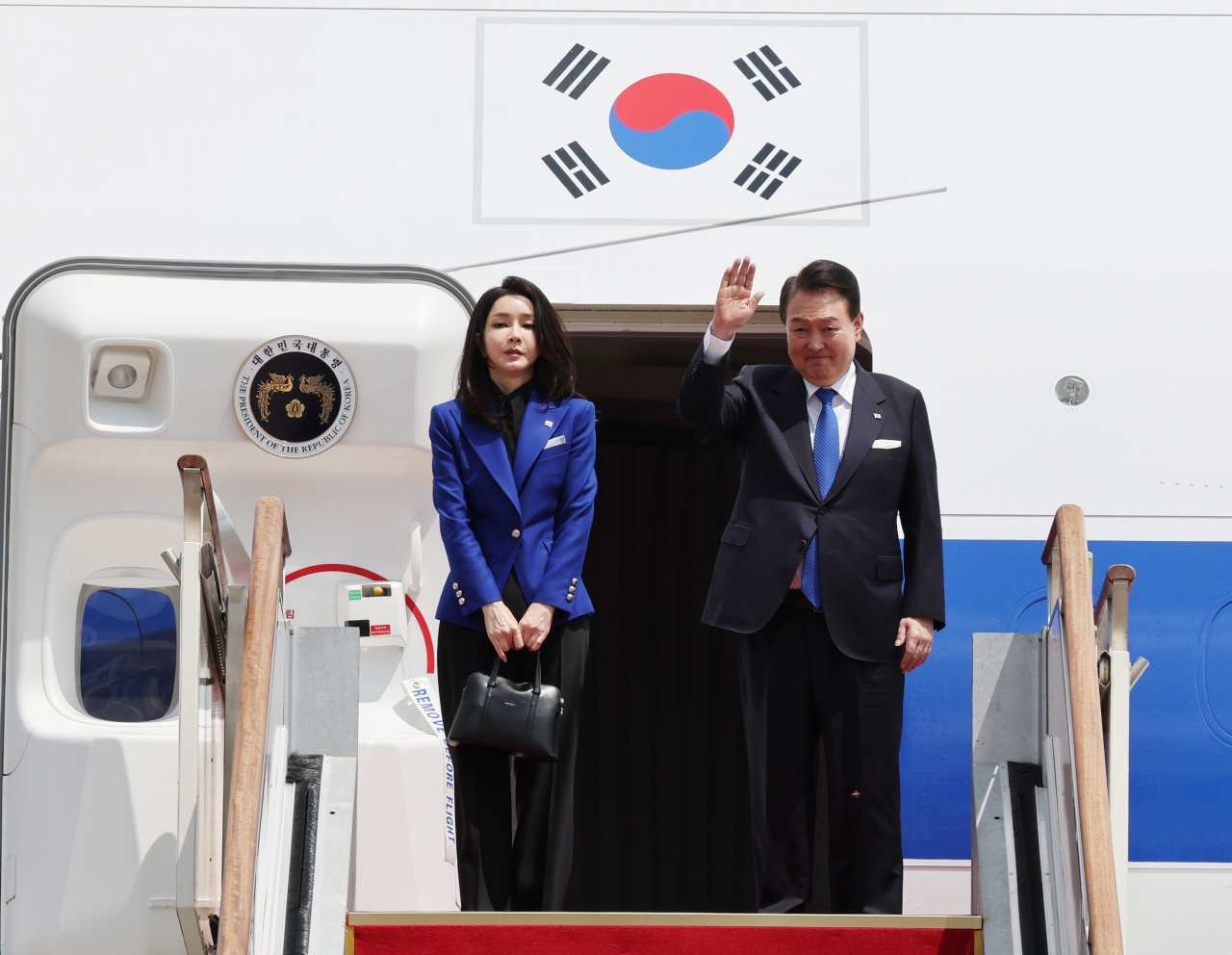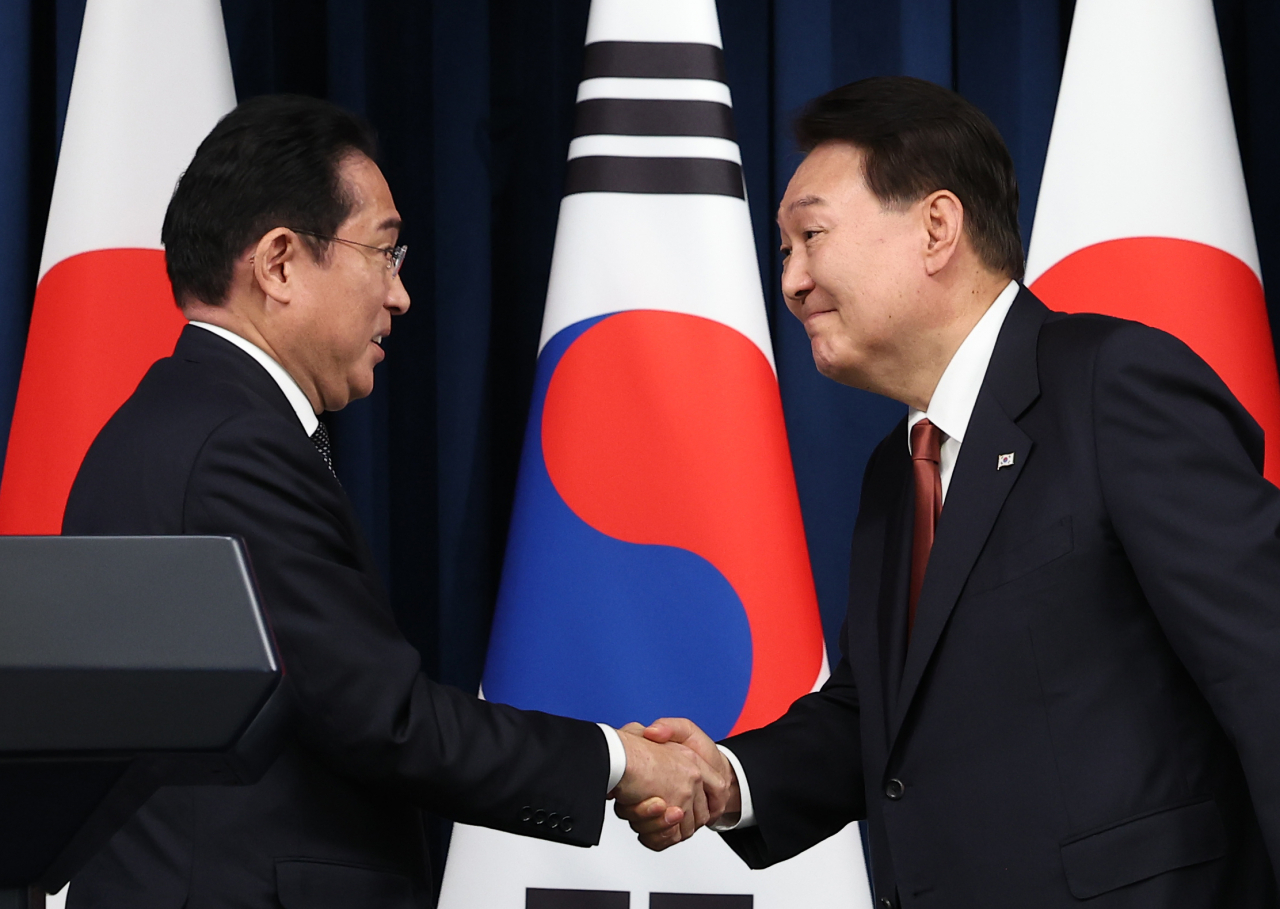 |
President Yoon Suk Yeol and his wife, Kim Keon Hee, greet officials while boarding the presidential plane at Seoul Airport in Seongnam, Gyeonggi Province, on Friday, prior to departing for Japan to attend the Group of Seven Summit in Hiroshima. (Yonhap) |
South Korean President Yoon Suk Yeol is poised to make his debut at the Group of Seven summit, which has been largely overshadowed by Russia's grinding war on Ukraine and China's growing assertiveness in the South China Sea.
But while these geopolitical challenges loom, Yoon has his own separate goal. The president seeks to use his visit to the city of Hiroshima as an opportunity to improve ties between South Korea and Japan, as well as display the two country's concerted efforts to surmount the intricate challenges stemming from bitter historical disputes.
Yoon embarked on his trip to Japan on Friday afternoon to attend the three-day G-7 summit -- which culminates on Sunday -- as an observer.
During his trip, Yoon met South Korean victims of the 1945 US atomic bombing of Hiroshima in the evening, the South Korean presidential office said on Friday.
Yoon has become the first South Korean president to have met with the survivors of the Hiroshima atomic bombing, which resulted in hundreds of thousands of civilian casualties.
"When our compatriots fell victim to the bombing, we were a colony, and after liberation, our country was weak and subject to a communist invasion, putting us in a very difficult state. Consequently, when our compatriots experienced such hardship and pain in foreign lands, the government and the state of the Republic of Korea were not by your side," Yoon told around 20 victims and their descendants. The Republic of Korea is the official name of South Korea.
"As the President representing the government and the country, I sincerely apologize for the fact that your homeland couldn't be with you during such moments of sorrow and pain. Once again, I extend my heartfelt consolation and words of comfort to you."
Koreans were among the second-largest group of victims after the Japanese, many of whom were forcibly brought to Japan to work during World War II under Japan's colonial rule of the Korean Peninsula from 1910 to 1945.
"The meeting shows the president's determination to improve bilateral ties between South Korea and Japan while resolving historical issues," presidential spokesperson Lee Do-woon said Friday morning during a press briefing.
"Although South Korea and Japan have opened the door to the future, the meeting symbolically demonstrates the unwavering determination of the two countries to never close the door to the past," Lee added.
Yoon and Japanese Prime Minister Fumio Kishida have also planned to pay their respects at a memorial stone in the Peace Memorial Park dedicated to the thousands of Korean victims of the atomic bombing.
The joint visit was agreed upon during their May 7 summit in Seoul, marking the first time leaders from South Korea and Japan jointly visit a monument honoring Korean victims. Yoon will also be the first South Korean president to visit such a memorial site.
"The joint visit by the two leaders will provide solace to the Koreans who perished in the atomic bombing of Hiroshima and serve as a place for South Korea and Japan to build a future of peace and prosperity together," Kim Tae-hyo, first deputy director of the National Security Office, said on Sunday.
Yoon is set to engage in a summit with Kishida on Sunday, a mere two weeks after their second one-on-one meeting in Seoul. This forthcoming round of leader-to-leader discussions marks the third encounter within a span of two months, following their initial meeting in Tokyo in mid-March, during which they committed to resuming "shuttle diplomacy."
 |
President Yoon Suk Yeol (right) and Japanese Prime Minister Fumio Kishida shake hands during a joint news conference following their summit at the presidential office in Seoul on May 7. (Yonhap) |
The trilateral summit between South Korea, the US and Japan is tentatively scheduled to take place on Sunday, marking the first in-person meeting since their encounter on the sidelines of the ASEAN summit in Phnom Penh, Cambodia, in November 2022.
The three-way meeting comes after two summits between Yoon and Kishida this year and Yoon's state visit to the US in April.
Yoon, Kishida and US President Joe Biden are expected to engage in discussions aimed at enhancing strategic cooperation and elevating trilateral collaboration to a new level, Kim said Sunday. It would help better address common challenges such as North Korea's nuclear and missile threats, regional supply chain instability and energy crises, he added.
Kim underlined that the talks will be anchored on the strengthened bilateral relationships between South Korea and the US, as well as between South Korea and Japan.
The three leaders are anticipated to discuss their trilateral security cooperation and progress that they have made to share North Korean missile warning data in real time. The three countries forged the agreement at the summit in November 2022.
In addition, Yoon is scheduled to engage in separate bilateral summits with leaders from seven countries, including Japan, on the sidelines of the G-7 summit.
On Friday, he held summit talks with Australian Prime Minister Anthony Albanese and Vietnamese Prime Minister Pham Minh Chinh. The following day, Yoon will meet with Indian Prime Minister Narendra Modi, Indonesian President Joko Widodo and British Prime Minister Rishi Sunak.
Lee, the presidential spokesperson, on Friday underscored that Yoon's attendance at the G-7 summit will "serve as an opportunity to solidify international solidarity in security, economy, industry and other areas, maximizing South Korea's national interests during this crucial period of evolving international order."
Lee explained that the Hiroshima G-7 summit is significant to strengthening solidarity with partner countries that have shared core values.
The G-7 is an informal grouping of advanced economies: the US, Canada, France, Germany, Italy, Japan and the United Kingdom. The seven countries meet annually to discuss issues including global economic governance, international security and energy policy.
As the host country, Japan has extended invitations to eight other nations, including South Korea, Australia, Brazil, Comoros, the Cook Islands, India, Indonesia and Vietnam. The Hiroshima summit will primarily revolve around discussions on "upholding the international order based on the rule of law" and "strengthening outreach to the Global South," encompassing regions such as Latin America, Asia, Africa, and Oceania.
Yoon is also scheduled to deliver a speech at the extended session of the multilateral forum on global issues of food security, health care, the climate crisis and energy development on Saturday. Lee said Yoon's speech will serve as a venue to reaffirm South Korea's leadership and its standing as a "global pivotal state."







